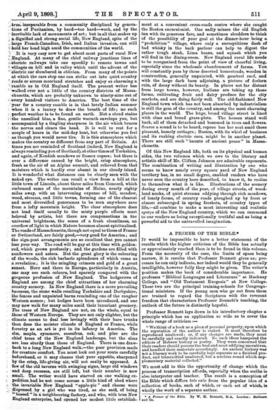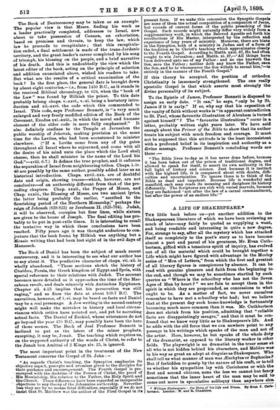A PRIMER OF THE BIBLE.*
IT would be impossible to have a better statement of the results which the higher criticism of the Bible has actually
or approximately reached than is to be found in this volume. From the necessity of the case, the limits of space being narrow, it is results that Professor Bennett gives us; pro- cesses he can only indicate, nor indeed would they be generally intelligible, however fully they might be given. The writer's position makes the book of considerable importance. He professes "Biblical Languages and Literature" at Hackney College, and "Old Testament Exegesis" at New College. These two are the principal training-schools for Congrega- tional ministers. If the young men who go out from them are trained to regard the Scriptures with the reverent freedom that characterises Professor Bennett's teaching, the outlook of the future is distinctly hopeful.
Professor Bennett lays down in his introductory chapter a principle which has an application so wide as to cover the whole range of criticism :—
"We think of a book as a piece of personal property, upon which the reputation of the author is staked. It must therefore be reproduced unaltered ; or, if any changes are made, they must be carefully and exactly indicated. No such ideas hampered the editors of Hebrew history or poetry. They were concerned that their readers should possess the best and most edifying narratives, and handled their materials accordingly. An ancient history was not a literary work to be carefully kept separate as a finished pro- duct, and transmitted unaltered, but a nucleus round which sup- plementary material collected."
We must add to this the opportunity of change which the process of transcription affords, especially when the scribe is also interpreter and teacher. The result is a conception of the Bible which differs toto ccelo from the popular idea of a,
collection of books, each of which, or each set of which, is wholly the work of a separate author.
• A Primer of the Bale. By W. H. Bennett, MA. London : Methuen and Co.
The Book of Deuteronomy may be taken as an example. The popular view is that Moses, finding his work as a leader practically completed, addresses to Israel, now about to take possession of Canaan, an exhortation, based on promises and threats, to keep the law, which law he proceeds to recapitulate ; that this recapitula- tion ended, a final settlement is made of the trans-Jordanic territory, and the great leader's career completed by his song of triumph, his blessing on the people, and a brief narrative of his death. And this is undoubtedly the view which the latest editor of the book, acting on the principle of selection and addition enunciated above, wished his readers to take. But what are the results of a critical examination of the book ? In the first place, the general date is brought down by about eight centuries,—i.e., from 1450 B.C., as it stands in the received Biblical chronology, to 624, when the "book of the Law" was found by Hilkiah the priest. To this date probably belong chaps. v.-xxvi., v.-xi. being a hortatory intro- duction and xii.-xxvi. the code which this commended to Israel. This code, says Professor Bennett, is "a very much enlarged and very freely modified edition of the Book of the Covenant, Exodus xxi.-xxiii., in which the moral and humane element of the older code is more fully emphasised." It also definitely confines to the Temple at Jerusalem the public worship of Jehovah, making provision at the same time for the Levites, who had been accustomed to minister elsewhere. (" If a Levite come from any of thy gates throughout all Israel where he sojourned, and come with all the desire of his mind unto the place which the Lord shall choose, then he shall minister in the name of the Lord his God."—xviii. 6-7.) It defines the true prophet, and it enforces the separation of Israel from neighbouring tribes. Chaps. i.-iv. 40 are possibly by the same author, possibly added later as an historical introduction. Chaps. xxvii.-xxx. are of doubtful date and origin, showing traces—which, however, are not conclusive—of an authorship different from that of the pre- ceding chapters. Chap. xxxii., the Prayer of Moses, and Chap. xxxiii., the Blessing of Moses, are two ancient lyrics, the latter being probably the earlier, "ascribed to the flourishing period of the Northern Monarchy," perhaps the reign of Jehoash (839-825) or Jeroboam II. (825-784). Judah, it will be observed, occupies but four lines, while sixteen are given to the house of Joseph. The final editing has pro- bably to be put in post-exile times. It is interesting to recall the tentative way in which these conclusions have been reached. Fifty years ago it was thought audacious to con- jecture that the book found by Hilkiah was anything but a Mosaic writing that had been lost sight of in the evil days of Manasseh.
The Book of Daniel has been the subject of much recent controversy, and it is interesting to see what our author has to say about it. The predictive character of chaps. vii.-xii. is wholly abandoned. "These sections sketch the history of haldma, Persia, the Greek kingdom of Egypt and Syria, with special reference to their relations with Judah. The account becomes more detailed as it approaches the time of the Mac- cabean revolt, and deals minutely with Antiochus Epiphanes. Chapter xii. 4-13 implies that his persecution was still raging," and so fixes the date at about 168-7 B.C. The narratives, however, of i.-vi. may be based on facts and Daniel may be a real personage. A Jew writing in the second century might well make the mistakes in history and local circum- 'stances which critics have pointed out, and yet be narrating actual facts. The Daniel of Ezekiel, whose utterances do not go beyond the year 470 B.C., may possibly have been the hero of these scenes. The Book of Joel Professor Bennett is inclined to put as the latest of the minor prophets, excepting, it may be, Jonah. The teaching which requires us, on the supposed authority of the words of Christ, to refer to the Jonah ben Amittai of 2 Kings xiv. 25, is ignored.
The most important point in the treatment of the New Testament concerns the Gospel of St. John : —
" As regards Christ's teaching, the Synoptics emphasize its objective aspect, precepts and promises given to the disciples for their guidance and encouragement. The Fourth Gospel is pre- occupied with the doctrine of the Person of Christ, the proof of His Measiahship, His relation to the Father, the Holy Spirit and the Church. These differences have been regarded as insuperable objections to any theory of the Johannine authorship. Neverthe- less they are by no means fatal difficulties, especially if we do not insist that St. Matthew was the author of the First Gospel in its present form. If we make this concession the Synoptic Gospels are none of them the actual competition of a companion of Jesus, but records of current forms of the public preaching of the Gospel. Such records might naturally differ very widely from a supplementary work, in which the Beloved Apostle set forth his recollections of His Master, interpreted by the reflection and experience of long years of ministry. Moreover, there are hints in the Synoptics, both of a ministry in Jude:a and of a form of the tradition as to Christ's teaching which approximates closely to the Fourth Gospel. According to Matth. xxiii. 37, He had often sought to win Jerusalem ; and Matth. xi. 27,—`All things have been delivered unto me of my Father : and no one knoweth the Son, save the Father ; neither doth any know the Father, save the Son, and he to whomsoever the Son willeth to reveal him,'—is entirely in the manner of the Fourth GospeL"
if this theory be accepted, the position of orthodox Christianity is immensely strengthened. The one really apostolic Gospel is that which asserts most strongly the divine personality of its subject.
To the Epistle of James, Professor Bennett is disposed to- assign an early date. "It can," he says, "only be by St. James if it is early." If so, why say that his exposition of the vanity of faith without works is "in apparent contradiction to St. Paul, whose favourite illustration of Abraham is turned against himself" P The "favourite illustrations" occur in a letter, probably written eight years later. We have said enough about the Primer of the Bible to show that its author treats his subject with much freedom and courage. It must not be supposed that this attitude is in the least inconsistent with a profound belief in its inspiration and authority as a divine message. Professor Bennett's concluding words are these :—
" The Bible lives to-day as it has never done before, because it has been taken out of the prison of traditional dogma, and allowed to speak for itself, to assert its own authority in the full light of history and science. Just because it is instinct with the highest life, it is compassed about with doubts, diffi- culties and uncertainties. To ignore these is to think of the Bible as dead and impotent. Because life is wonderful and manifold, each man reads its meaning and deciphers its history differently. The Scriptures are rich with varied marvels, because they are fashioned ' not after the law of a carnal commandment, but after the power of an endless life."



































 Previous page
Previous page